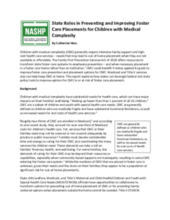This page contains documents and other resources related to children's care in the Americas. Browse resources by region, country, or category.
Displaying 731 - 740 of 3191
Rep. Patricia Williams of the US state of Florida, a foster parent herself, is calling on the governor of Florida and the state Department of Children and Families "to institute a moratorium on young people aging out of the foster care system, to help them avoid the two-pronged health and economic crises of COVID-19 without state support," according to this article from the Miami Times.
UNICEF seeks the services of a consultant to support internal and external work on unaccompanied and separated children (UASC), including those affected by COVID-19 and containment measures.
“If the government takes a kid out of their family, we make a commitment to that child that their life will be better because of the government interaction,” said James McIntyre - who "spent 17 years in the custody of the Illinois Department of Family services" - as quoted in this article from the Nation.
"Trump administration officials ejected nearly 9,000 unaccompanied migrant children from the U.S. without court hearings — taking no precautions to protect them from traffickers," according to this article from the Huffington Post.
"At least 8,800 migrant children who arrived at the southern border without their parents have been swiftly expelled from the country and denied U.S. refuge during the pandemic under an emergency policy," according to this article from CBS News.
This report explores how states can leverage federal and state policy tools to improve options for CMC in or at risk of foster care placement.
This scoping review was conducted to synthesize the state of the science on proximal, modifiable individual and interpersonal factors that are associated with psychosocial well-being among adolescent youth in foster care.
This study investigated rates of guardianship and adoption dissolution using a complete entry cohort from a large state foster care system and the associations between child characteristics and risk factors with dissolution.
Participants at this event will have the chance to join with others in their region -- either virtually or in-person -- with local events across the country and global network events in countries worldwide.
This paper describes the upEND movement, a collaborative movement aimed at abolishing the child welfare system as we know it and reimagining how we as a society support child, family, and community safety and well-being.


